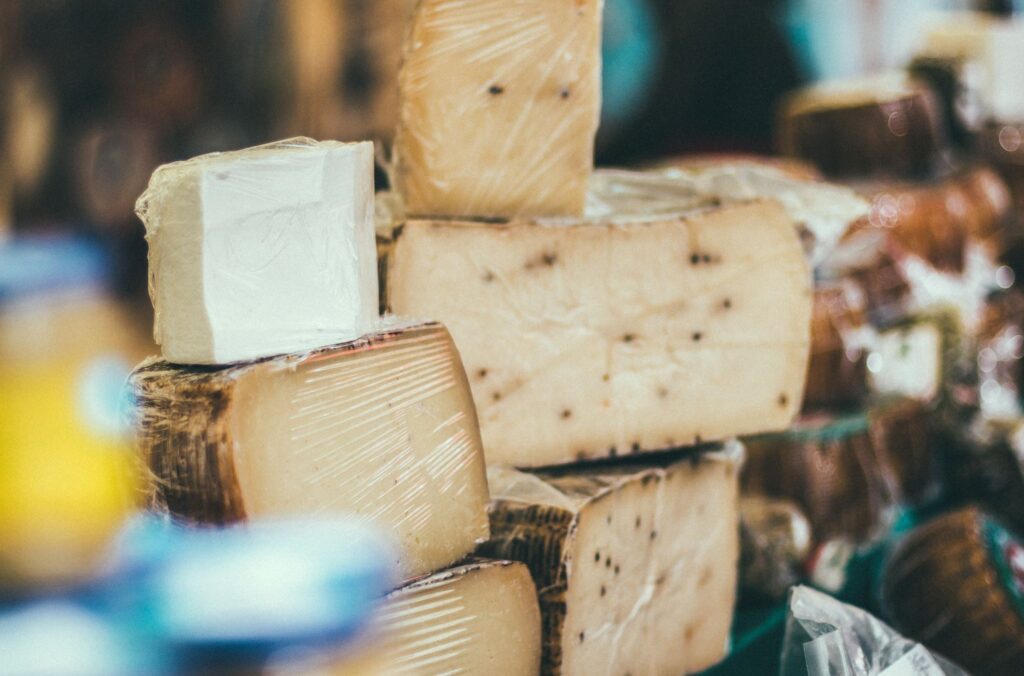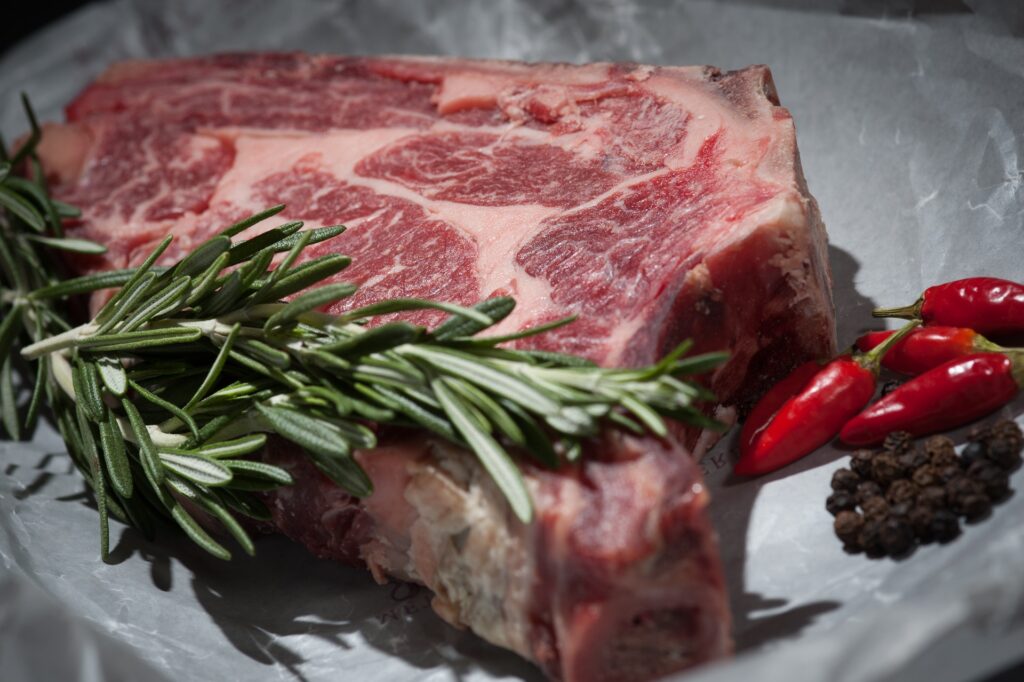Studies show that there are several benefits to limiting or giving up completely meat and dairy consumption. A plant-based diet rich in fresh fruits and vegetables, grains, beans, legumes and nuts, is a healthy and nutritional diet and people who follow it are generally associated with eating fewer calories and less fat, weighing less, and having a lower risk of cardiovascular disease, diabetes, and cancer than nonvegetarians.
Eating fewer animal products has also a huge impact on the environment. 18% of greenhouse gas emissions are caused by the meat and dairy industry, hence, just by switching to a vegetarian diet would help cutting on emission and helping the environment. Even by moving away from beef and lamb in favour of chicken and pork could reduce your CO2 emission by 560 kg a year! Eating less meat also reduces water use by up to 1/3. Did you know a beef burger uses 4300 litres of water which is equal to two-month worth of showers? But it does not stop here! 25% of money spent on food in the UK is used to buy meat and fish, which is more expensive than buying fruits and vegetables, meaning that going on a plant-based diet would have an impact on your wallet too!
A CASE STUDY: NZ’S NEW SCHOOL CURRICULUM

A recent study from the University of Otago, New Zealand, revealed that a population-wide shift to a plant-based diet could reduce New Zealand’s greenhouse gas emissions by as much as a staggering 42%!
Lead researcher and Otago medical student, Jono Drew, also explained that the global food system is having an impact not only on the climate crisis but also on the growing burden of common chronic diseases like cardiovascular disease, diabetes, and cancer and that such dietary change would greatly improve population health and save the healthcare system billions of dollars in the coming decades.
So, you know what they say…start them young!
In January 2020, New Zealand launched a new curriculum for secondary school students aimed at raising awareness on how consuming meat and dairy products can increase global temperatures contributing to the causes of climate change.
New Zealand’s students are encouraged to have meatless days in favour of more plant-based foods and even taught simple, practical and delicious ways to replace dairy and meat. But the new curricular activity does not stop here! It also aims to raise awareness around recycling, driving less, and buying second-hand in order to reduce the country’s greenhouse gas emissions and combat climate change.
This is an astonishing breakthrough in education as it acknowledges and highlights the need for changes. Such revolutionary implementation was possible thanks to New Zealand’s Prime Minister Jacinda Ardern who, understating the gravity and the threat that climate change poses on our planet, is tackling emission targets for the agriculture sector by launching new reforms as well as actively working towards making the country carbon neutral by 2050.
Pushed by the recent findings, some politicians welcomed the new educational resources supporting the importance for children to learn how climate change will impact them in their adult life. However, in a country where agricultural commodities account for 60% of the national exports, pointing to intensive agriculture as one cause of greenhouse gases, lead to the curriculum being heavily criticised by the Kiwi farmers who felt unfairly targeted. This does not mean the curriculum is not good. It only shows the conflicting, and far too often, influential political and economic interests.
THE TRUTH ON DAIRY

The impact on us and the environment
Dairy products are rich in calcium and have been often praised for improving good strong bone health. Who’s the big pushed behind this? A team of qualified scientists with tons of evidence? Nope. A big pusher behind the intake of milk has been the milk industry that for decades promoted milk as the answer to strong bones. Observational studies, though, tell a different story. Increased calcium intake may actually be associated with heart disease and there’s plenty evidence that dairy foods, which have high saturated fat content, are high contributors to cholesterol and they have been linked to possible increase of ovarian and prostate cancer.
Also, let’s not diverge from the calcium topic: milk is not the only source of calcium! Examples of calcium rich foods are whole wheat products, vegetables from the brassica family, vegetables with dark green leaves, beans and legumes, nuts and seeds, as well as Okra, herbal teas like nettle and red clover, and even mineral water.
There are also other factors to consider when talking about milk. One rather big issue is the use of antibiotics to keep the cattle alive in often precarious farm condition causing a surge in antibiotic-resistant bacteria.
Studies have also shown that, from an evolutionary point of view, consuming dairy does not make sense as human beings are the only animals that consume dairy after weaning. Furthermore, from other species!
Finally, there is also the very important unethical point of view to face, which sees the farming industry having to continually fertilize cows to produce milk and having to kill their offspring. Yep…they kill them!
Last, but not least, cow farming is also a major contributor to water and air pollution as well as deforestation which all lead to climate change.
Plant-based milk alternatives
When talking about milk, it’s therefore worth considering switching to a common plant-based milk as a healthier, more adequate, ethical and sustainable choice over cow, goat, sheep and buffalo milk. What’s more, there’s plenty choices out there such as:
- Soy Milk
- Almond Milk
- Coconut Milk
- Oat Milk
- Rice Milk
- Cashew Milk
- Hemp milk
- Pea milk
- Peanut milk
- Macadamia Milk
Dairy-free alternatives
Even when talking about other dairy products, we are spoilt for lactose-free choices! If you think lactose-free products taste like cardboard, think again! Here’s just some of the many mouth-watering options available out there:
- Daiya Mozzarella Style Shreds (Vegan)
- Follow Your Heart Vegan Gourmet Cheddar
- Teese Cheddar Vegan Cheese
- Tofutti Better Than Cream Cheese (Vegan)
- Follow Your Heart Shredded Parmesan Alternative (Vegan)
- Treeline Treenut Cheeses
- Homemade Dairy-Free Queso Cheese Dip (Vegan)
- Mozzarisella
- Violife
- VegAmigo Pizza Melty
- Bute Island Foods Sheese
- Vegusto
- Nutcrafter
- Vbites Cheezly
- Green Vie
- …and…one of my favourite, if you live in the UK, is Tesco’s “Free From” plant based cheddar with ‘Coconut Oil Alternative To Jalapeno & Chilli’. Just yummy!
Click here to read more on dairy products exposed and milk alternatives.
THE TRUTH ON MEAT

The impact on the environment
In 2007 “The New York Times” reported that Gidon Eshel, a researcher at Bard College in the U.S., found vegetarian diets use approximately a ton and a half less carbon dioxide per year than typical meat diets. Meats and meat products, as well as the methods used to process them, create more pollution and require more resources than the production methods for plant-based products. So, going meat free or minimizing your intake of meat products, can be an environmentally conscious decision as well as economical and health-conscious choice.
Let’s start by looking at some of the environmental facts!
- Grazing and land use: intensive livestock production requires large quantities of harvested feed. More than 80% of the corn we grow and more than 95% of the oats are fed to livestock. The world’s cattle alone consume a quantity of food equal to the caloric needs of 8.7 billion people which more than the entire human population on Earth! Free-range animal production also requires land for grazing, which in some places has led to land use change. According to The Food and Agriculture Organization (FAO), an agency of the United Nations (UN), “Ranching-induced deforestation is one of the main causes of loss of some unique plant and animal species in the tropical rainforests of Central and South America as well as carbon release in the atmosphere.” The meat industry is also directly responsible for 85% of all soil erosion in the U.S. Land quality decline is also associated with overgrazing, as these animals are removing much needed nutrients from the soil without the land having time to recover. The livestock sector is also the primary driver of deforestation in the Amazon, with around 80% of all converted land being used to rear cattle. A shocking 91% of land deforested since 1970 has been converted to cattle ranching. 87% of all agricultural land just in the U.S. is used to raise animals for food and sadly, approximately 260 million acres of U.S. forest have been cleared to create cropland to produce feed for animals raised (ironically) for food.
- Water use: According to the Environmental Protection Agency, raising animals for food is the number-one source of water pollution.It takes 11365 litres of water to produce a pound of meat vs only 114 litres to produce a pound of wheat. Almost one-third of the water used in the western U.S. goes to crops that feed cattle!
- Effects on aquatic ecosystems: In the Western United States, many stream and riparian habitats have been negatively affected by livestock grazing. This has resulted in increased phosphates, nitrates, decreased dissolved oxygen, increased temperature, turbidity, and eutrophication events, and reduced species diversity.
- Greenhouse gas emissions: At a global scale, The Food and Agriculture Organization (FAO) has estimated that livestock accounts for about 18% of anthropogenic greenhouse gas emissions estimated as 100-year CO2 equivalents.
- Effect of air pollution on human respiratory health: Meat production is one of the leading causes of greenhouse gas emissions and other particulate matter pollution in the atmosphere which have been associated with respiratory diseases like asthma, bronchitis, and chronic obstructive pulmonary disease (COPD), as well as increased chances of acquiring pneumonia from bacterial infections.
- Energy consumption: Producing just one hamburger uses enough fossil fuel to drive a small car 20 miles. A typical pig factory generates the same amount of raw waste as a city of 12,000 people.
- Animal waste: simply put…how to get rid of all that waste?
- Effects on wildlife: The growing demand for meat is contributing to significant biodiversity loss as it is a significant driver of deforestation and habitat destruction.
You can check out the full stats here.
The impact on our health

Experts say that by 2050 the developed world will need to reduce their meat consumption by 50%. It might surprise you how much of an impact going meat-free can have on our planet … but also on your health and if you dig deeper, you’ll quickly see how many, from celebrities to athletes to entire companies, are supporting the movement to eat more plant-based foods. Why? Because they have a solid point!
Eating less meat has been linked to better health. Mind you, you don’t have to give up meat completely to get many of the benefits. One of the most effective ways to look at it is to start in small steps. Could you do Mondays-free-meat? And if that’s not a problem, how about Monday to Tuesday or Wednesday meat-free? Easy? Perhaps, then, you could consider weekdays-meat free! But again, even just a day or a couple of days meat-free a week could bring you benefits. Of course, it isn’t enough just to minimize meat consumption; you have to replace it with healthy foods choices. Going meat free to find yourself eating chips and pizza or deep-fried vegetables is not going to help!
Meat is a source of protein, iron, zinc, magnesium, and B vitamins, but it’s not the only source! If you decide to limit or avoid meat, it’s important to compensate these nutritional gaps with other foods. For example:
- Protein: vegetables high in protein include lima beans, bean sprouts, green peas, spinach, sweet corn, asparagus, artichokes, brussels sprouts, mushrooms, and broccoli.
- Iron: fruits and vegetables high in iron include dried fruits, dark leafy greens, podded peas, asparagus, button mushrooms, acorn squash, leeks, dried coconut, green beans, and raspberries
- Zinc: vegetables high in zinc include shiitake mushrooms, green peas, spinach, lima beans, lentil sprouts, asparagus, beet greens, broccoli, okra, and sweet corn.
- Magnesium: vegetables that are magnesium riche include green leafy vegetables (e.g. spinach and kale), fruit (figs, avocado, banana and raspberries), nuts and seeds, legumes (black beans, chickpeas and kidney beans) and many vegetables (peas, broccoli, cabbage, green beans, artichokes, asparagus, brussels sprouts)
- Vitamin B12 is a nutrient that helps keep the body’s nerve and blood cells healthy and helps make DNA, the genetic material in all cells. Vitamin B12 also helps prevent a type of anemia called megaloblastic anemia that makes people tired and weak. It is naturally found in animal products, such as fish, meat, poultry, eggs, milk, and milk products, but it is generally not present in plant foods. However, you can easily find Vitamin B12 fortified breakfast cereals and non-dairy milk. You can also find Vitamin B12 in the famously “love it or hate it” vegetarian spread Marmite. You can spread it on bread or add it to broths and sauces.
*** Please note, if you are planning on going meat-free and are unable to meet dietary recommendations through diet alone, you should consider talking to a dietician or healthcare provider before beginning a new supplement regime.
So, which are the benefits of going meat-free? Wait no more, as here they are!
- Disease prevention. Studies have shown that a diet high in red meat consumptionincrease these risks of Type 2 diabetes and coronary heart disease whereas a vegetarian diet decreases it. Giving up meat can reduce the risks of cancer, heart disease, high blood pressure, diabetes, kidney stones, gallstones and osteoporosis. The drop in such risk factors is partly due to lower cholesterol intake, since plant-based food items are cholesterol-free and dairy products tend to be lower in cholesterol than meat.
- Lower risks of cancer. In 2002, researchers at Loma Linda University, in the U.S., began a 10-year study of nearly 70,000 Seventh Day Adventists, whose religious doctrine advises them against eating meat. The data showed an association between a vegan diet and a decreased risk for all cancer types. Interestingly, the date also showed that that vegetarians experienced less gastrointestinal cancer, such as colorectal cancer, and that vegan women experienced fewer female-specific cancers, such as breast cancer.
- Lower blood pressure. According to findings published in the journal Public Health Nutrition, vegetarians and vegans have less hypertension than meat-eaters, Why? There’s a suggestion that this is due to the lower average weight and higher intakes of fruits and vegetables. Leafy green vegetables are rich in nitrates, which are known help to manage blood pressure. Some research suggests that eating 1–2 servings of nitrate-rich vegetables every day can reduce hypertension for up to 24 hours.
- It’s good for your gut! One study published in the journal Frontiers in Nutrition found that sticking to a vegan or vegetarian diet could help boost the good bacteria in the gut; participants who didn’t eat meat had higher levels of certain good bacteria than participants who did eat meat. And do you know what else? Many mental states like depression, dementia & Alzheimer are linked to immune system and inflammation which are regulated by the gut. Click here to read about the link between mental health and nutrition.
- Healthy weight management. Of course, you could be a vegetarian an still fry the hell out of every single piece of vegetable making it rather unhealthy, however, studies have shown that a plant-based diet right in fresh fruits and vegetables is linked to better cardiovascular health which is also linked to maintaining a healthy weight. A five-year study published in the Journal of the Academy of Nutrition and Dietetics in 2013 revealed that people who don’t eat meat have a lower average BMI than meat-eaters, and that vegans have a significantly lower obesity rate than omnivores. Plus, a new study presented at The Obesity Society’s 2013 meeting found that overweight/obese people following a vegan or vegetarian diet lost more weight than those who consumed meat, even though both groups took in the same number of calories.
- Better skin! Eating more fresh fruits, vegetables, and whole grains kits you up with antioxidants, which neutralize the free radicals that can give you wrinkles, brown spots, and other signs of aging. Out are the expensive creams!
- Improving your mood. Adding more fruits and veggies to your diet is a natural mood-booster. Economists and public health researchers from the University of Warwick (in the U.K.) and Dartmouth College (in the U.S.) studied the eating habits of 80,000 people in Great Britain and found that mental well-being appeared to increase with the number of daily portions of fruit and vegetables.
- You’ll feel energized! This is not Start Trek, however did you know that eating more spinach, kale, beans, and other foods high in dietary nitrates may help you feel more energized over time? Why? Because dietary nitrates have vascular benefits and reduce blood pressure meaning they open up blood vessels allowing more oxygen in making us feel more…well…energized!
Meat-free alternatives
With so many reasons to go meat-free is no wonder the meat alternatives markets are expanding. And if you still fancy the feel a meat-like byte, you can try many meat-free vegetarian options out there, from “Quorn” sausages and burgers, to many of the “Impossible Foods”, “Beyond Meat”, “Linda McCartney’s” or Lidl’s “My Best Veggies” range.
And if you need some inspiration for recipes, you can start here.
FANCY WATCHING A DOCUMENTARY ON THIS TOPIC?

If you have a chance, I recommend watching “The Game Changers” and “Food Choices” for which trailers can be found here:
The Game Changers (currently available on Netflix) is a 2018 documentary film that looks at the benefits of plant-based eating by covering multiple success stories of athletes and touching on other supporting arguments that extend to non-athletes. The film is well documented and provides a lot of references to scientific studies. The documentary follows former UFC fighter James Wilks who, following a debilitating injury, researches nutrition and travels the world to discuss his findings with elite athletes who have made the switch to plant-based diets with successful and off the charts results. Athletes interviewed in the film include Arnold Schwarzenegger, Dotsie Bausch and Patrik Baboumian.
Food Choices (2016) is a fascinating documentary that follows filmmaker Michal Siewierski as he looks at many misconceptions about food and diet. Well researched and packed with interviews with world-renowned experts, including Dr. T Colin Campbell, Dr. Richard Oppenlander, Rich Roll, Joe Cross, Dr. John McDougall, Capitan Paul Watson, Dr. Toni Bark, Dr. Pam Popper, Dr. Michael Greger, Gloria Athanis and several others, it explores the impact that food and dietary choices have on people’s health as well as the impact that this has on our planet and it’s animal species.
JOIN THE MOVEMENT

The benefits are huge not just for the environment and it’s fauna but also for our health and our wallet.
So, why not give it a try? You don’t need to cut meat completely out, just cut down! Start with a day a week, and tag along #meatfreemondays (don’t forget to tag us!)
A small (but hugely beneficial) change for you…can also be a big (and much needed) change for the world!



